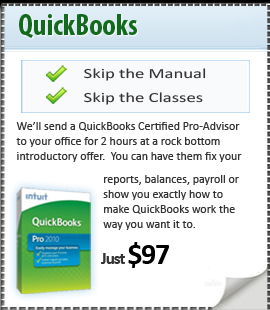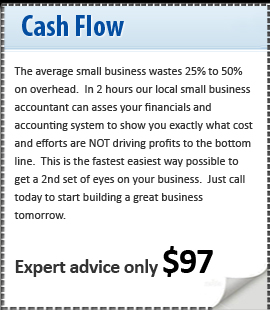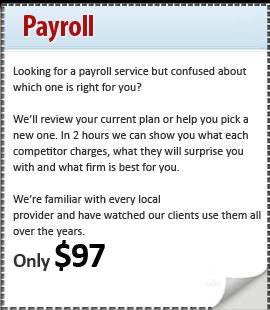"Building Cash Flow - How To Apply For Financing"
|
Where to Apply, and Estimating How Much Your Business Needs. Why Financing is Important to Your Business. Many people dream of starting and managing their own business. Some actually do start a business and achieve their dream; others keep on dreaming. Why is this so? What separates the successful entrepreneur from the unsuccessful? In many cases, it seems to be whether the prospective business owner has access to sufficient funds to turn the dream into reality. You've probably heard stories about how many businesses fail each year. Sometimes their failure can be traced to a lack of financing. It is difficult to guess how many businesses never even start because of that same lack of funding. Just learning where and how to get the funds to start or expand your business can be confusing, frustrating and time consuming. The amount of financing may be as little as $100 or more than $ one million, based on the type of business. Many different businesses can be started with a relatively small amount of money. This guide will explain how, when and where to secure the capital your business needs to be a success and will give you step-by-step instructions on how to finance your business in the most profitable ways possible. Finding money may be difficult at times, but the economy depends heavily on small businesses like yours. It is possible to get the money that your business needs, and the first step to success is knowing how and where to look. WHO CAN GET FINANCING TO START OR EXPAND A BUSINESS? You can. Almost every valid business idea can be funded; it's a matter of knowing where to look. When a new business is a success, everyone involved wins too. You as the owner certainly benefit. So does the economy, since your business helps it to grow. A successful business also creates new jobs and adds an important product or service to the community. It is for all these reasons that organizations and individuals may be willing to invest in your business. As your business profits so do your investors. HOW MUCH MONEY WILL YOU NEED? Every business is different, but it is still possible to get a reasonable idea of how much cash your business is likely to need by considering a few key factors. Does Your Business Produce a Product or Provide a Service? Initially, a service business will require less cash because it will not have high material and equipment costs. If you intend to manufacture a product, you must consider the type and amount of direct materials and equipment needed and expenses incurred. Who Will Provide Labor? Do you intend to do most of the work yourself or will you hire employees to assist you? Contributing your own time to the business is one way to keep costs down. Later, when your business is firmly established, you may wish to hire employees to take over many of the day-to-day operations. Do You Have Personal Funds to Invest in Your Business? Almost all investors prefer or require that you contribute some of your money to the business. This contribution of unborrowed funds is called equity. There is no fixed percentage for this equity contribution, but most lenders require at least 25 percent of the total amount needed to establish the business. The amount of equity required is also influenced by other credit factors, such as management experience and adequacy of collateral. Can You Provide for Your Personal Expenses While the business is Getting Started? It is unusual for a beginning business to show a profit in the first few years. It's good strategy to plan to cover your personal living expenses for at least six months while your business is getting started. If your business is already operating, it may be necessary to reduce your salary while you try to expand. If you have your own funds set aside for your personal expenses during these periods, you will have one less expense for which you will need borrowed funds. ESTIMATING YOUR EXPENSES There are certain expenses that virtually all businesses must incur. The following chart will help you estimate your typical expenses. (This is not an all-inclusive list. It provides some of the more typical expenses.)
A manufacturing business will also have specific expenses related to production. Therefore, the following expenses should also be considered:
ASSESSING YOUR FINANCIAL NEEDS Once you have determined your expenses, you will need to estimate what percentage of the funds you can supply yourself and what percentage you must find elsewhere. At this point, the figure may seem overwhelming. Don't be discouraged. It's far better to have realistically assessed your situation early than to rush into a new venture before you've planned adequately. Almost all businesses need outside funds and yours probably will not be an exception to the rule. You should prepare a month-by-month cash flow projection for the entire first year, perhaps with the help of your accountant or banker. If the projection is realistic, it will clearly show how much financing you need. Local SBA offices have cash flow projection forms. Ask for Form 1100. Yes, starting a new business can be risky, but it can also pay big rewards both in personal satisfaction and in economic return. TYPES OF FUNDING - DEBT OR EQUITY? In deciding how to finance your business, you need to consider certain questions:
In order to answer these questions, it is important that you clearly understand how debt financing and equity financing work and that you be aware of the advantages and disadvantages of each. DEBT FINANCING Debt is a direct obligation to pay something (cash) to someone (an investor or lender). In exchange for having lent you the money, an investor will expect to be paid interest. Obviously, this means that you will repay more money than you have borrowed. Therefore, an important feature of debt financing is the interest rate you will be charged. Interest Rate and Risk The interest rate usually reflects the level of risk the investor is undertaking by lending you money. Investors will charge you lower interest rates if they feel there is a low risk of the debt's not being repaid. Investors will raise interest rates if they are concerned about your ability to repay the debt or if you have a history of slow payments to lenders as shown on your personal or business credit reports. It is important to realize a new business is likely to be charged a higher interest rate than a well-established business because the lender will feel a new business represents a greater risk. Here's an example of how interest rates can affect your loan repayment amount: Example 1: A ten-year loan for $50,000 at 12 percent interest requires monthly payments of $717. Example 2: A ten-year loan for $50,000 at 15 percent interest requires monthly payments of $807. A payment difference of $90 each month, over 120 months, makes the loan in Example 2 almost $11,000 more expensive over the life of the loan. What Do Debt Lenders Look For? A debt lender will evaluate your loan request by considering answers to several key questions: Can you offer reasonable evidence of repayment ability- If your business is new, a lender may charge you a high interest or may refuse to make the loan entirely. In contrast, if you have been in business for a significant period of time, you may find debt lenders very happy to extend loans. EQUITY FINANCING Equity financing involves no direct obligation to repay any funds. It does, however, involve selling a partial interest in your company. In effect, an equity investor becomes your business partner and will have a degree of control over how your business is run. For example, the sale of stock, one type of equity financing arrangement, typically works as follows: Step 1 - You determine from your analysis that your business will need more funds than you can provide. Step 2 - You consider financing options and decide that you prefer to sell an interest in your company rather than borrow money. Step 3 - You arrange to offer a sale of stock. This can be much more complicated than it sounds because you must comply with an array of legal and reporting requirements for the life of your business. After shares of your stock are purchased, investors own a portion of your company, which they can keep or sell to others. What Do Equity Investors Look For? Equity investors buy part of your company by supplying some of the capital your business requires. Because they will own a share of your business, equity investors are interested in the business' long-term success and future profitability. Equity investors can resell their interest in your company to other investors. If your business is doing well, they will be able to sell their stake at a higher price than they paid and make a profit. Legally, equity investors are more exposed to risk than are debt investors. If your business fails, equity investors stand to lose more money than debt investors do, since creditors are typically paid before owners in the event of business failure. Since equity investors are taking the greater risk, they expect to earn more on their investment than do debt investors. Advantages of Equity Financing With equity financing, you do not repay the money invested by others (unless a payoff agreement is made at the time of investment). This can be important when cash is at a premium. Also, your ideas for making your business successful may carry more weight with a potential equity investor than with a debt investor. Since it is in an equity investor's best interest for your business to grow and expand, he or she will be more likely to consider sound business ideas than will a debt investor, who is more concerned with the security of the deal proposed. Many people who are interested in starting or expanding a business have more ideas than money; this can be an important factor in favor of equity financing. In addition, equity investors, with their genuine interest in your success, can be a good source of advice and contacts for your business. Disadvantages of Equity Financing The biggest drawback of equity financing is that you give up some control over your business. You may or may not find this acceptable. Remember, when you accept equity partners, you are selling part of your business. It may be very difficult to retain control in the future. Also, you may find your equity investors do not always agree with your plans for the business. However, since they own part of your business, you will have to consider their point of view, even if you do not agree with their choices. Finally, equity financing tends to be very complicated and invariably will require the advice of attorneys and accountants. A great deal of paperwork must be prepared and filed. For example, public companies must comply with specific legal regulations that govern their ways of doing business. POSSIBLE SOURCES OF FINANCING Most new small businesses start out by borrowing money rather than by selling stock. If your business does well, you may at some point combine both types of financing as your needs change. Because knowing how, when and where to borrow is so important to the success of your business, you should be aware of the variety of possible funding sources. These fall into two basic categories: private sources, such as your local bank, and public sources, such as the federal government. PRIVATE SOURCES Private sources of financing are either personal sources (savings or loans from friends and relatives) or external sources (debt lenders, equity lenders and arrangements that combine debt and equity). Savings Personal funds are the most likely, and the most typically used, source of funds for a new business. Most lenders require that a reasonable percentage of your own funds be invested in your business, as an indication that you will work hard to make the business a success. You will find most investors unwilling to consider your request for funding if you have not contributed cash. This can present a problem, though. Most entrepreneurs do not have the personal resources to provide all of their initial financing. They are not alone. Almost all business owners must borrow money from outside sources. It is helpful if you, as an owner, provide some of the funds from your own savings. You may also want to consider such personal sources as the cash value of a life insurance policy, a home equity loan or even a credit card. Combining personal savings with external sources of debt and equity will permit you to benefit from the effects of leverage, i.e., using other people's money to earn a profit for yourself. One of the biggest advantages of using personal savings to fund your business is your easy access to those funds. There are no loan applications to complete, no lenders to visit, no paperwork to prepare and no interest payments to make. If available, personal savings are a valuable source of capital for your business. Finally, a big advantage of having your own start-up capital is that it ensures that you retain ultimate control of and responsibility for your business. Friends and Relatives Friends and relatives are often an important source of capital for your business. Since they know you well, the terms of repayment are likely to be more flexible than those of strangers. Keep it formal. It's a good idea to prepare a formal agreement when a friend or relative is willing to invest money in your business. This will make the relationship professional and will help to avoid future misunderstandings about how much was borrowed or when it should be repaid. The investment can take the form of a direct loan or an equity investment. Review the previous section on debt versus equity financing to determine which arrangement will be best in your particular circumstances. Based on their personal relationship and their impression of your business judgment, friends and relatives may be willing to invest in your business even when others may not. Beware, however. Because they know you well, they may wish to be more involved in the day-to-day operations of the business than you would like. Friends or relatives may feel their investment entitles them to a routine say in how the business is run, even though you intend to repay the loan. Debt Financing When it is necessary to look to someone other than yourself or a close friend or relative for business funds, it helps to be aware of other sources. Banks Banks are financial institutions that accept deposits and make loans. They fall into several categories, such as savings and loans, thrift institutions and commercial banks. Knowing the category in which they include themselves can tell you a lot about the kinds of loans these banks are interested in making. Savings banks are more experienced in dealing with consumer loans, such as home mortgages and automobile loans. Commercial banks have more experience and interest in business loans. This doesn't mean that you can't go to a savings bank for a business loan. It may be a good choice. Just be sure to consider that bank's primary focus and level of experience with your type of request. Probably the most important point to keep in mind when dealing with a bank is that bankers don't like risk. Their primary concern is always the safety of their funds. How do they operate? Banks may be one of the first sources that come to mind when you begin searching for additional business capital. Certainly, they will meet your most basic condition: they have money available to lend. However, it may be difficult for a new business to borrow from a bank since lenders usually prefer to lend to established businesses. Keep in mind, the first responsibility of a bank is to protect its depositors. As a result, bankers tend to be very cautious about lending money. Banks come in all shapes and sizes and there are some real differences among them. Small community banks with two or three branches may operate quite differently from large commercial banks with hundreds of loan offices. You will want to carefully review the differences among banks before you select a particular one. Each type offers certain advantages. A commercial bank may be more experienced and familiar with a business loan request, but a community bank may know you personally and have more interest in development in the local community. Credit unions are another source. Their overall goal is service to their members, as opposed to profit making. As a result, their interest rates and other terms may be more favorable than those offered by a bank. Credit unions are regulated by the National Credit Union Administration. What are the advantages of a credit union? The company for which you or another family member works may have a credit union. If you decide to start your business while you are still working for a large company, you may be able to borrow some of the capital you will need from the credit union. As your business becomes more profitable and better able to support you financially, you may decide to concentrate all your energies and time on your business. Credit union interest rates are often lower than the rates charged by other lenders. The amount you will be able to borrow from a credit union may not be large, but this source of funds may be helpful in making initial purchases for your business. Also, a loan application through a credit union may be more likely to be approved, as the individual evaluating your loan request may know you. Where can you get more information? If you're employed, ask the human resources department of the company where you work about your eligibility to join a credit union. There are directories available at your local library listing all of the credit unions in the United States. Consumer Finance Companies Consumer finance companies make small personal loans secured by collateral. Unlike banks, they do not accept deposits and they lend under the jurisdiction of each state's small loan regulations. Consumer finance companies will often consider loans with 100 percent financing because the loans are secured by an asset. How do they operate? Consumer finance companies charge higher interest rates and processing fees than banks and credit unions but can be more flexible about approving requests. Loans from this source are more expensive because they are considered to be more risky. In some cases, the interest rate you will be charged will be the highest allowed by law for your state. Consumer finance companies are often approached by people who have poor credit ratings. Certainly, if you want to start a business and your credit rating is questionable, you will find consumer finance companies a more likely source of funds. However, this does not mean that you should only borrow from a consumer finance company if you have credit problems. You should be aware that loans from this source will usually not exceed several thousand dollars. Also, keep in mind that if you can't repay your debt, the item that you purchased with the funds will be seized. Where can you get more information? The classified advertising section of your telephone directory lists consumer finance companies under the heading of Loans. Call and request a meeting, or ask them to send you written information. Commercial Finance Companies The primary purpose of a commercial finance company is to provide loans to purchase inventory and equipment. This can be a useful resource, particularly if your business will manufacture a product or act as a wholesaler. Commercial finance companies are similar to consumer finance companies but concentrate on business loans rather than consumer purchases. How do they operate? Like consumer finance companies, commercial finance companies charge higher rates of interest than banks. They also may be more willing than banks to approve your loan request. Commercial finance companies will require your debt be collateralized. This means if you purchase a computer with the funds you have borrowed, they will have a direct claim on your computer. If you can't make your monthly payments, the commercial finance company will be entitled to take your computer and sell it to recover its investment. Where can you get more information? Check the telephone directory for a list of commercial finance companies in your area. You should research your rights when borrowing from a loan company by reading your state's laws concerning debt repayment. Trade Credit When a vendor allows you to buy a product and to delay paying for it, this is known as trade or vendor credit. Vendors offer this service to help make their products more attractive and to induce you to buy from them rather than elsewhere. Offering easy credit terms encourages sales. Keep in mind that the vendor is in business to make money. There may be a hidden cost for flexible credit terms in the form of slightly higher prices. How does it work? Trade credit is one of the most readily available sources of financing for your business. In many situations, you will be able to purchase supplies and equipment directly from a vendor and spread your payments over several months or years. Often it is possible to make no or a minimal down payment and to avoid interest charges as well. Even suppliers who will not extend credit in the beginning of your relationship may be very willing to do so after you have placed several orders. When you are trying to pay for equipment and/or supplies that your business needs, trade credit can be invaluable. Office furniture, computers, certain raw materials and manufacturing equipment are examples of products that can be purchased with trade credit. Where can you get more information? Discuss payment terms with vendors with whom you deal or plan to deal. There may be dramatic differences in terms among different suppliers. Talk to several suppliers before making a decision. Remember to ask what types of credit they offer and if they grant a discount for prompt payment. Also, be sure to compare prices. Vendor financing is not desirable if you are being charged substantially more for the same product you can purchase elsewhere more cheaply with cash. Insurance Companies Insurance companies are a possible source of financing for your business because they make commercial loans as a means of investing unused portions of their income. Generally, insurance companies make term loans and mortgage loans. How do they operate? If you borrow from an insurance company, you can expect terms and interest rates similar to those available from a commercial bank. Insurance companies can provide your business with a large amount of capital at market interest rates, but you must have assets sufficient to cover the debt, plus 20-30 percent extra. In effect, you mortgage your property to free cash for your business. This allows you to retain title to the property while freeing cash invested in it. Insurance companies usually have high loan limits; this makes them a good source of funds if you need a large supply of capital. Where can you get more information? Speak with your insurance agent or ask friends to make recommendations. You may also wish to request information packets from insurance companies' loan offices. Factor Companies A factor company can be a useful source of funds if you are already in business and have made sales to customers. Factor companies purchase your accounts receivable at a discount, thereby freeing cash for you sooner than if you had to collect the money yourself. You transfer title of your accounts receivable to the factor company in exchange for a cash payment. How do they operate? Factor companies provide two types of financing alternatives: recourse factoring and non-recourse factoring. In recourse factoring, you retain part of the risk for ultimately collecting the debts owed to you. The factor company assists you by speeding up the process. For example, the factor company purchases your receivables and advances you cash while the accounts are being collected. However, if your customers do not pay, you will be held responsible for repayment to the factor company. In non-recourse factoring, you sell all rights and obligations concerning your accounts receivable. The factor company purchases your receivables and collects the debts owed. If a customer does not pay, you will be under no obligation to the factor company. Factor companies can be a useful source of funds for a new or existing business. They are not appropriate as a means of seed capital to start a business because they require that you have accounts receivable to sell. Where can you get more information? Factor companies often advertise in the business sections of newspapers. Usually the advertisement will say "We buy accounts receivable" or something similar. Make sure you work with a reputable company that will not alienate your customers by harassing them for payment. Leasing Companies A leasing company is a business that rents various types of equipment to businesses and individuals. By renting rather than buying the equipment your business will need, you will be able to avoid many capital expenditures associated with the purchase of equipment. How do they operate? Many leasing companies require a down payment or several months' prepaid rent. Some, however, may allow you to lease equipment without requiring any prepayment. This depends upon the relative size or worth of the asset leased. The small amount of cash needed to secure the use of equipment for your business makes leasing very attractive to many business owners. However, since you do not actually own the equipment, the leasing company may repossess it if you miss a payment. An advantage provided by leasing is that you will need little or no cash to secure equipment and you will be able to upgrade your equipment more easily than if you purchased it. If your industry experiences rapid changes in technology, leasing may help you to avoid the expense of purchasing quickly outdated equipment. Obviously, you will not be able to meet all of the financing needs of your business by leasing. You will still need going expenses, such as employee salaries. Leasing, however, can allow you to hold on to the cash you may otherwise have spent on equipment, and this cash savings can be used in other, less easily financed, areas. Where can you get more information? Many equipment suppliers offer leasing arrangements in addition to actual sales. Discuss with suppliers and vendors what types of items they lease and what terms they offer. A service contract can usually be purchased for an additional charge. |
||
Who We Are
The owner and principal of the company is Richard G. Robinson, CPA. He is licensed in New Mexico since 1995 and originally licensed in Colorado since 1987.
Our Staff
Since we are a virtual office, we utilize the assistance of accountants and bookkeepers who work from home all over the U.S. This is great for you because our burden rate for employees is about 1/2 that of our competitors and that savings is reflected in our rates.
QuickBooks®
If you need QuickBooks® help click the link below to ask us a question by email or just call us at 505-466-2830. Richard enjoys helping clients with QuickBooks® issues and has been a QuickBooks® consultant for many years.





